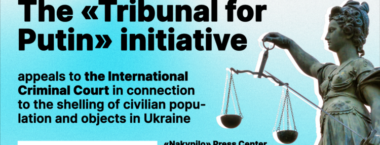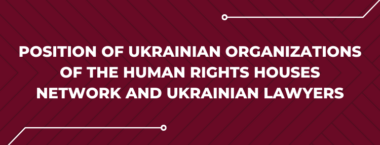• Almost 80,000 orders were issued by lawyers during the year
• More than 2,000 attorneys who provide 24/7 legal assistance in criminal matters on the account of the state budget
• Every day more than 200 attorneys’ visits to the suspects
• An advocate arrives to a detainee in 1 hour
• A detainee may waive the attorney’s services only in the presence of the attorney
This is a format in which a system of legal aid – an important institution that contributes to equitable justice began to operate in Ukraine since January 1, 2013. Ukrainian legislation guarantees access to legal aid at public expense to all detained persons (both according to administrative and criminal law) as well as protection from prosecution to persons in need.
Everyone who was detected, particularly during mass protests in Kyiv in winter 2013-2014, could see in practice the importance of access to the lawyer’s services from the moment of detention. It is timely access to a lawyer that helps to save from violence; avoid the confession of a crime that was not committed; contact with relatives; ensure access to appropriate medical care, etc.
Now everyone can tell about the detention: a friend, relatives, or a detained him/herself – calling on a single phone number of the Free Legal Aid (FLA) line – 0 800 213 103.
Several organizations – the Ukrainian Legal Aid Foundation, the Ukrainian Helsinki Human Rights Union and the International Renaissance Foundation analysed the first year of the system operation, including the opinions of advocates, directors of the Centres for Free Secondary Legal Aid Providing, clients, employees of the internal affairs authorities, prosecutors and judges.
The study confirmed the existence of many stereotypes that often stand in the way of the right to defence. In particular, the less people know about the system, the less they can trust it. 58.6% of people had no information on the possibility to obtain free legal aid. The awareness of people about the rights and safeguards during detention is even lower. Only 29.6% of those surveyed mentioned the right to counsel at public expense.
An important factor that affects the efficiency of the system is an improper procedure and form of informing on human rights during the detention. This usually happens by means of the detainee to sign the document where his/her rights are listed in fine print. However, usually the real explanation is not provided. In this context the opposition of the MIA in posting information on the rights protection and an opportunity to call on the line of the FLA in the local police departments, investigative offices, etc. is not clear. Twice this year the MIA denied distribution of such information materials to the Coordinating Centre for Legal Aid Providing.
A new procedure for defender involvement minimized the possibility to involve so-called “pocket” lawyers, but the police continue to see certain risks for effective investigation in the system of free legal aid, particularly as some respondent investigators noted, an advocate “may give the detainee an opportunity to circumvent the law”, “the system determines the “impossibility to put strain on a suspect during interrogation" and led to “reduction of the number of cases solved through fewer admissions”.
An important factor that affects the efficiency of the procedure of the lawyer involvement and effectiveness of existing safeguards is that improper fixation of the detention time, invitation of persons as witnesses, “information withholding” and so on still remain a common practice.
At this stage it is not yet possible to carry out a comprehensive assessment of the quality of legal assistance provided by lawyers at the expense of the state, but it is important to implement the quality management system for legal assistance provided at the expense of the state. Subsequently, a set of tools that this quality management system includes will provide an opportunity to assess the quality of legal aid. The efforts of the Coordinating Centre on lawyers working in free legal aid system directed on constant training are also important.
For more information on the results of the study please see the study.



